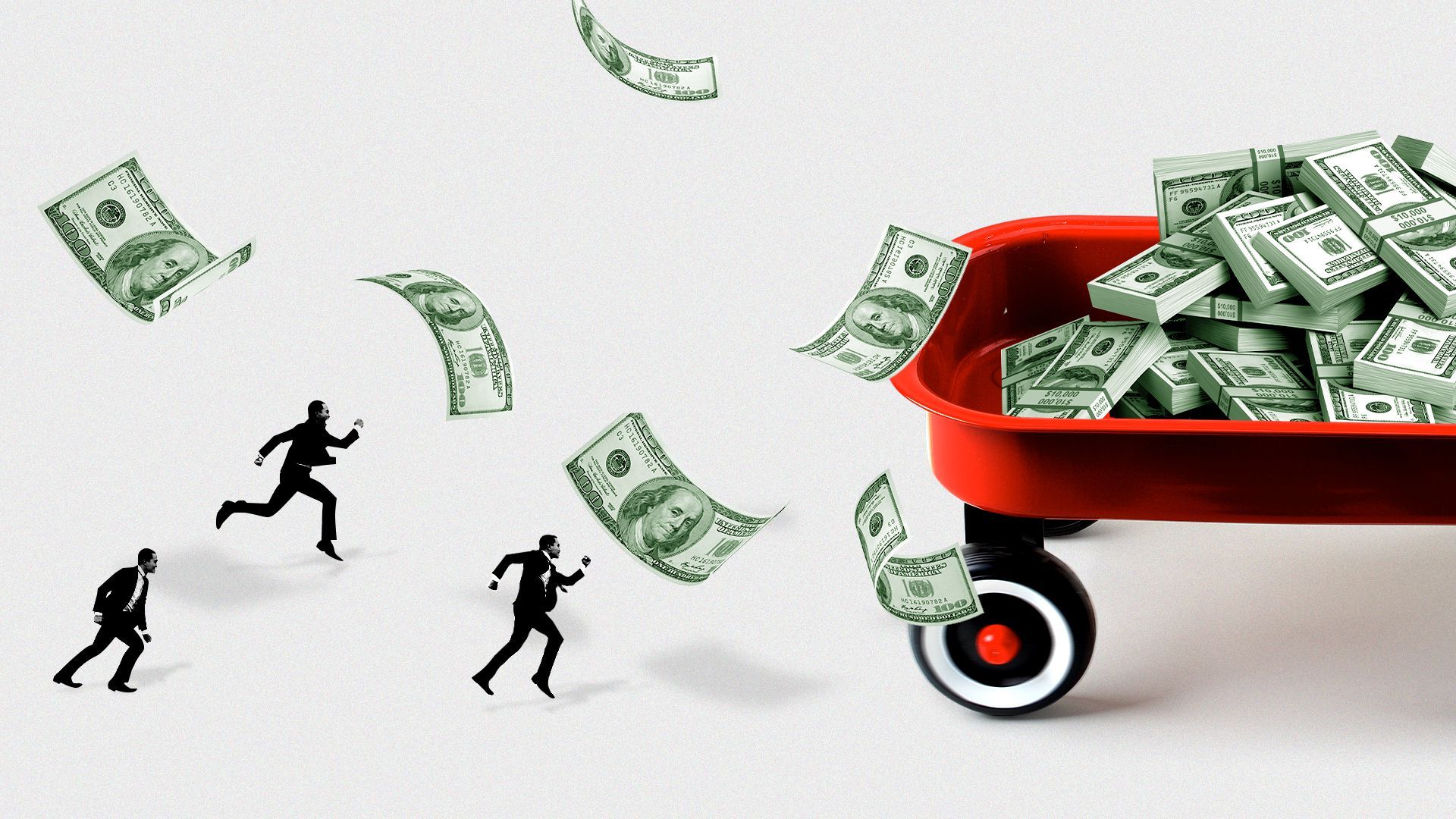| | | | | | | Presented By Canadian Pacific | | | | Axios Markets | | By Dion Rabouin ·May 05, 2021 | | Good morning! Was this email forwarded to you? Sign up here. (Today's Smart Brevity count: 1,128 words, 4 minutes.) 🎙 "Leadership does not mean domination. The world is always well supplied with people who wish to rule and dominate others. The true leader is a different sort; he seeks effective activity which has a truly beneficient purpose. He inspires others to follow in his wake, and holding aloft the torch of wisdom, leads the way for society to realize its genuinely great aspirations." - See who said it and why it matters at the bottom. | | | | | | 1 big thing: The new housing bubble |  | | | Illustration: Aïda Amer/Axios | | | | Today's mortgage market is much more regulated and has much stronger fundamentals than during the housing bubble of the mid-aughts, but it's not a story that's as simple as rising demand and low supply. What's happening: Unlike the environment ahead of the 2008 crash, housing prices are not being driven higher by a raft of underqualified borrowers getting mortgages they can't afford from unscrupulous banks. - They're being driven by government and central bank intervention — radically increased money supply, mortgage forbearance, stimulus checks, low taxes and low interest rates.
Driving the news: Mortgage applications decreased for the second week in a row, down 0.9% from one week earlier, according to data from the Mortgage Bankers Association (MBA) for the week ending April 30, 2021. - Both conventional and government purchase applications declined, but average loan sizes increased for each loan type.
- Applications have fallen in 8 of the past 9 weeks and 13 of the 18 weeks so far this year, according to MBA's data.
- Yet prices have only risen higher, with existing homes reaching a record high average sales price of $329,100 in March.
By the numbers: CoreLogic's latest report finds housing prices increased 11.3% in March over March 2020 — the most in 15 years — and were up 2% from February when prices jumped by 10.4%, which had been the largest annual increase since 2006. - Boise, Idaho, led all metropolitan areas with a year-over-year increase of 27.7%.
What they're saying: "This is a sign that the competitive purchase market, driven by low housing inventory and high demand, is pushing prices higher and weighing down on activity," Joel Kan, MBA's associate vice president of economic and industry forecasting, says in a statement. - "The higher prices are also affecting the mix of activity, with stronger growth in purchase loans with larger-than-average balances."
Between the lines: Economists have been quick to point to a lack of housing stock as the reason for rising prices, but homebuilders already have ramped up new home construction. - In fact, new homes made up more than a quarter (25.7%) of single-family homes for sale in the U.S. during the first quarter. That's up from 20.4% a year earlier and represents the highest share on record, according to Redfin.
- New home prices are only expected to rise further as prices for homebuilding essentials such as lumber, steel, copper, aluminum and corn jump.
- New homes are on average more than $35,000 more expensive than they were last year.
The bottom line: This isn't your older brother's mortgage bubble. It's a paradigm shift in the market that could be here for quite some time. |     | | | | | | 2. Catch up quick | | Treasury Secretary Janet Yellen said she wasn't "predicting or recommending," interest-rate hikes to rein in any inflation spurred by President Joe Biden's proposed spending, after markets fell following her comments a few hours earlier. (Bloomberg) The U.S. trade deficit hit a record in March and could widen further this year as domestic demand outstrips the U.S. economy's productive capacity. (Reuters) The value of dogecoin rose to 58 cents, jumping 40% in just 24 hours and up around 11,210% so far in 2021. (MarketWatch) Mentions of "inflation" have jumped nearly 800% year over year, however, coupled with a record net margin, inflation so far has been positive for corporate earnings. (Yahoo Finance) |     | | | | | | 3. Fidelity cuts Ant Group's valuation in half | | Axios' Bethany Allen-Ebrahimian writes: The clouds still aren't parting for Ant Group, Alibaba's fintech arm, which has been caught up in a major antitrust push by China's regulators. Driving the news: U.S. mutual fund Fidelity Investments halved its valuation of Ant after the Chinese regulatory crackdown, the Wall Street Journal reports. - Filings show Fidelity estimated the company's worth at $144 billion in February — down from a $295 billion valuation last August.
Details: Last November, regulators halted Ant's IPO, projected to be the largest in history, at the last minute, and Ant hasn't caught a break since. - They then slapped Ant parent company Alibaba with a $2.8 billion fine.
- Ant was forced to restructure and spin out its products into different entities.
The big picture: China is seeking to avoid the structural economic problems monopolies have created in the U.S., while simultaneously looking to prevent companies from accruing enough power to challenge the Chinese Communist Party's decisions. - And China's Big Tech firms are trying to use the government's antitrust crackdown against each other, urging regulators to go after rivals.
- But the "battle royale between companies could end up even further empowering the Chinese government, which already keeps a tight grip over online content," the New York Times' Li Yuan notes.
Go deeper: Antitrust scrutiny is a growing concern for China's Big Tech |     | | | | | | A message from Canadian Pacific | One railroad connecting
U.S.-Mexico-Canada | | |  | | | | A Canadian Pacific transaction offers greater certainty for stockholders and creates more rail competition for shippers. Remaining the smallest Class 1 railroad, a combination with CP appropriately manages regulatory risk and creates significant benefits for customers and stakeholders. | | | | | | 4. Hedge funds and professional money managers keep selling stocks |  | | | Illustration: Aïda Amer/Axios | | | | With euphoria taking over the stock market, so-called smart money investors like hedge funds and asset managers at major investment firms are hitting the sell button, expecting prices to fall. What we're hearing: Retail traders were the only group to buy U.S. equities for the third week in a row as institutional clients sold equities for the third straight week and hedge funds sold for the fifth week, posting their largest outflows in more than a month, Bank of America's data analytics team reported in a note to clients. - BofA's clients sold both single stocks and ETFs for the second consecutive week, with overall four-week average flows near record lows and the lowest since mid-January.
- "Clients were net sellers (-$2.2B) of US equities for the third week in a row as the market reached another record high and equity sentiment marched further toward euphoria," analysts said.
Watch this space: The rolling four-week average of money flows from hedge funds hit a record low in BofA's data history (which dates back to 2008) and were three standard deviations below the average. - "The only other time flows were this extreme was at the end of last August after which the S&P 500 declined by 2.5% and 2.3% in the subsequent one and four weeks, respectively," analysts noted.
On the other side: U.S. households increased their exposure to stocks to 41% of their total financial assets in April, the highest level on record, WSJ reported, and stock funds have seen net inflows for seven straight weeks. - Since March 2020, equity allocations have risen more than 3.5-times faster than they typically do following bear markets.
- Flows have been underpinned by record borrowing from hedge funds and big banks, as well as a record level of margin debt being held by retail and institutional investors.
- Corporate buybacks also have increased notably and year to date are up 19% versus last year's levels at this time.
Where it stands: The market has not declined by 5% in six months, which happens on average three times a year, and it's been 14 months since the S&P 500 had a 10% correction ("a once per year phenomenon, historically"), BofA equity and quant strategists Savita Subramanian and Jill Carey Hall said in a note. One level deeper: Sell-side analysts are recommending stocks at increasing rates, with BofA's sell-side indicator rising for a fourth consecutive month to its highest in 13 years. - "The current level is ... the closest to the 'Sell' threshold since May 2007, after which the S&P 500 declined 7% in the subsequent 12 months," Subramanian and Hall wrote.
- "Increasingly euphoric sentiment is a driver of our more cautious outlook as we believe that vaccine deployment, economic reopening, stimulus, etc. are largely priced in."
|     | | | | | | A message from Canadian Pacific | One railroad connecting
U.S.-Mexico-Canada | | |  | | | | A Canadian Pacific transaction offers greater certainty for stockholders and creates more rail competition for shippers. Remaining the smallest Class 1 railroad, a combination with CP appropriately manages regulatory risk and creates significant benefits for customers and stakeholders. | | | | Thanks for reading! Quote: "Leadership does not mean domination. The world is always well supplied with people who wish to rule and dominate others. The true leader is a different sort; he seeks effective activity which has a truly beneficient purpose. He inspires others to follow in his wake, and holding aloft the torch of wisdom, leads the way for society to realize its genuinely great aspirations." Why it matters: On May 5, 1941, Ethiopian Emperor Haile Selassie returned to Addis Ababa from exile after the British Empire defeated the Italian occupiers in the East African campaign. - Selassie, a defining figure in modern Ethiopian and African history, led Ethiopia to become a charter member of the United Nations and in 1963, presided over the formation of the Organisation of African Unity, the precursor of the African Union, and served as its first chairman.
************** This newsletter is written in Smart Brevity®. Learn how your team can communicate in the same smart, clear style with Axios HQ. | | | | Axios thanks our partners for supporting our newsletters.
Sponsorship has no influence on editorial content. Axios, 3100 Clarendon Blvd, Suite 1300, Arlington VA 22201 | | | You received this email because you signed up for newsletters from Axios.
Change your preferences or unsubscribe here. | | | Was this email forwarded to you?
Sign up now to get Axios in your inbox. | | | | Follow Axios on social media:    | | | | | |





No comments:
Post a Comment